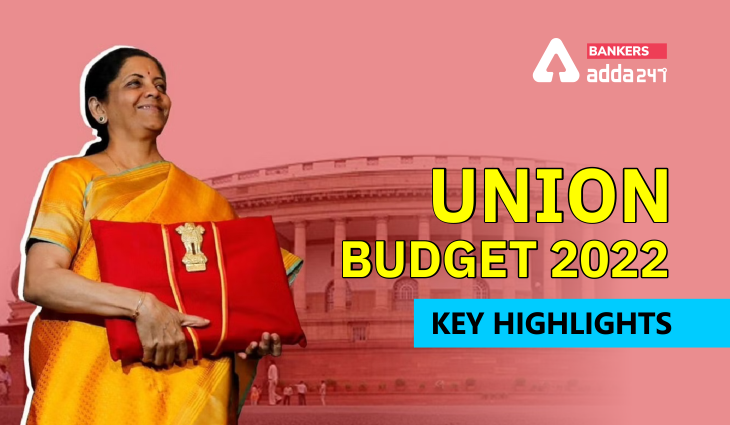Table of Contents
Union Finance Minister, Nirmala Sitharaman is presenting the Union Budget 2022 for the 4th time in a row. She will be presenting the financial statements and tax proposals for the fiscal year 2022-23 (April 2022 to March 2023). A Made in India tablet has replaced the traditional ‘Bahi Khata’ as Union Finance Minister Nirmala Sitharaman leaves the Finance Ministry’s office to go to the Parliament to present the Budget.
The Economic Survey 2021-22 was released on 31st January 2022 by the Chief Economic Advisor of India, V Anantha Nageswaran. The government sees the Indian economy growing at 8-8.5 per cent in the financial year 2022-23 (FY23).
Budget and Constitutional Provisions
- The Union Budget is the yearly financial report estimating the income and expenditure presented to outline future policies to be adopted by the government for sustainable growth and development.
- According to Article 112 of the Indian Constitution, the Union Budget of a year is referred to as the Annual Financial Statement (AFS).
- It is a statement of the estimated receipts and expenditure of the Government in a Financial Year (which begins on 1st April of the current year and ends on 31st March of the following year).
- The Budget Division of the Department of Economic Affairs in the Ministry of Finance is the nodal body responsible for preparing the Budget.
- The first Budget of Independent India was presented in 1947.
Here are the key highlights from the Union Budget 2022-23:
- Finance Minister Nirmala Sitharaman, while presenting the Budget, said that the country is expected to grow at 9.27 per cent.
- Two parallel tracks for the next 25 years: public investments in infrastructure and a budget that is inclusive and futuristic.
- 7 focus areas: PM Gati Shakti, Inclusive Development, Productivity Enhancement, Sunrise Opportunities, Energy Transition, Climate Action and Financing of investments.
- This Union Budget seeks to lay the foundation & give a blueprint of the economy over ‘Amrit Kal’ of next 25 years – from India at 75 to India at 100.
- Production Linked Incentive schemes in 14 sectors with the potential to create 60 lakh new jobs, and the additional new production of Rs 30 lakh crore.
- Startups will be promoted to facilitate Drone Shakti to make drone a service. In select ITIs in all states, courses will be started.
- Announcement of Ken Betwa river linking project worth Rs 44,605 crore to be beneficial for capital goods players.
- Govt continuously encouraging digital banking. Taking forward, 75 digital banking units will be set up in 75 districts.
- PM Modi’s development initiatives for the North East will be implemented by the North Eastern Council. This will enable livelihood activities for the youth and women. This scheme is not a substitute for the existing Centre or state schemes.
- Emergency Credit Line Guarantee Scheme will be extended up to March 2023 and the guaranteed cover will be expanded by Rs 50,000 crore to cover an amount of Rs 5 lakh crore.
- Issuance of e-passports will be rolled out in 2022-23 to make it easier for citizens. Ease of business 2.0 will be launched.
- 5G spectrum auctions to be carried out in calendar 2022 to enable the launch of services within FY22-23.
- Animation, visual effects, gaming and comics sector offers immense potential to employ youth. An AVGC promotion task force with all stakeholders will be set up to recommend ways to realise this and build domestic capacity for serving our markets and the global demand.
- Special Economic Zones Act will be replaced with new legislation for the development of enterprises and hubs. It will cover the existing industrial enclaves and enhance the competitiveness of exports.
- Effective capital expenditure of the Central government is estimated at Rs 10.68 lakh crore in 2022-23, about 4.1% of GDP.
- To facilitate domestic manufacturing of 280 gigawatts of installed solar capacity by 2030, an additional allocation of Rs 19,500 crore for PLI for manufacturing of high-efficiency modules with priority to fully integrate manufacturing units to solar PV modules will be made.
- Digital rupee to be issued using blockchain and other technologies and will be issued by RBI starting 2022-23. This will give a big boost to the economy. This will give a big boost to the economy. Introduction of central bank digital currency to boost digital economy, and lays down a solid plan of the government to have a public digital currency.
- For 2022-23, an allocation of Rs 1 lakh crore has been made to assist the states in catalysing overall investments in the economy. These 50-year interest-free loans are over and above normal borrowings allowed to states. It’ll be used for PM Gati Shakti-related and other productive capital investments of states.
- Aims to lower the winding up of companies to 6 months from 2 years currently.
Tax Proposals:
- Nirmala Sitharaman announced a new tax rule for taxpayers where a taxpayer can file an updated return on payment of taxes within two years from the end of the relevant assessment year.
- Both Centre and States govt employees’ tax deduction limit to be increased from 10% to 14% to help the social security benefits of state government employees and bring them at par with the Central govt employees.
- Income from transfer of digital assets (Cryptocurrency) to be charged 30% tax, plus 1% tax on the transaction.
- Corporate surcharge to be reduced from 12% to 7%, says Finance Minister Nirmala Sitharaman.
- Existing tax benefits for startups, which were offered redemption of taxes for 3 consecutive years, to be extended by 1 more year.
- Income from Long Term Capital Gains will be taxed at 15%, the Finance Minister said.
- The gross GST collections for the month of January 2022 are Rs 1,40,986 crore —the highest since the inception of the tax.
- Duty concessions are being given to promote electronics manufacturing, wearables and hearables devices included. Duty concessions to [parts of mobile phones including camera modules etc.
- Customs on polished diamonds, gemstones cut to 5%. Simply sawn diamonds will be exempted. To facilitate the export of jewellery through e-commerce, simplified regulations will be in place by June this year.
- Deduction for employer contribution to NPS increased to 14% from 10% earlier for State govt employees on par with central govt employees.
- No set off permitted against other income.
- Alternate Minimum Tax for cooperative societies to be cut to 15%. The proposal will reduce the surcharge on cooperative societies to 7%, for those whose income is between Rs 1 crore and Rs 10 crore.
- Unblended fuel to get an additional duty of 2 rupees per litre from October 2022.
- Finance Minister announced a reduction of surcharge on unlisted shares from 28.5 per cent to 23 per cent.
Deficit/Expenditure:
- Proposes fiscal deficit of 4.5% of GDP by 2025/26
- Projects fiscal deficit of 6.4% of GDP in 2022/23
- Revised fiscal deficit for 2021/22 at 6.9% of GDP
- Total expenditure in 2022/23 seen at 39.45 trillion rupees
- States will be allowed 4% fiscal deficit to GDP in FY23
- 50 year interest free loans over and above normal borrowing allocated to states
- Scheme for financial assistance to states for capital investment outlay to be 1 trillion rupees in 2022/23
Financial inclusion:
- 100% of 1.5 lakh post offices will come on the core banking system, enabling financial inclusion and access to accounts through net banking, mobile banking, ATMs, and also providing online transfer of funds between post office accounts and bank accounts.
- This will be helpful especially for farmers and senior citizens in rural areas, enabling interoperability, and financial inclusion.
Fiscal Deficit target set at 6.4% for FY23:
- FY23 total expenditure seen at Rs 39.45 lakh crore.
- Total Receipts other than borrowing seen at Rs 22.84 lakh crore.
- Revised Fiscal Deficit 6.9% of GDP in FY22 as against 6.8% in Budget estimates.
- Fiscal Deficit target set at 6.4% for FY23.
National Telehealth programme:
- Sitharaman announced a National telehealth programme in Budget 2022. An open platform for the National Digital Health Ecosystem will be rolled out. It will consist of digital registries of health providers and health facilities, unique health identity and universal access to health facilities The pandemic has accentuated mental health problems in people of all ages.
Education sector:
- States will be encouraged to revise syllabi of agricultural universities to meet needs of natural, zero-budget & organic farming, modern-day agriculture. One class, one TV channel’ program of PM eVIDYA will be expanded from 12 to 200 TV channels. This will enable all states to provide supplementary education in regional languages for classes 1 to 12.
Indian Railways:
- PM Gati Shakti plans one of the four pillars of growth. 25,000 km of national highways to be built in 2022-23.
- 400 new-generation Vande Bharat trains with higher efficiency and better facilities for passengers will be developed in the next three years. Over 2,000 km of the rail network to be brought under the indigenous world-class technology KAWACH, for safety and capacity augmentation.
India’s farmers
- Procurement of wheat in Rabi season 2021-22 and the estimated procurement of paddy in Kharif season 2021-22 will cover 1,208 lakh metric tonnes of wheat and paddy from 163 lakh farmers & Rs 2.37 lakh crores will be the direct payment of MSP value to their accounts.
- Chemical-free natural farming to be promoted in India
- Use of drones to be promoted for crop assessment, digitization of land records, spraying of insecticides and nutrients. Fund to be facilitated through NABARD to finance start-ups for agriculture and rural enterprise which are relevant for the farm produce value chain.
Infrastructure: PM Awas Yojana
- In 2022-23, 80 lakh houses will be completed for identified beneficiaries of PM Awas Yojana; 60,000 houses will be identified as beneficiaries for PM Awas Yojana in rural & urban areas.
- 60,000 crore allocated for providing access to tap water to 3.8 crore households. In 2022-23, 80 lakh households will be identified for the affordable housing scheme.
Defence:
- 68% of the capital procurement budget for Defence to be earmarked for domestic industry to promote Aatmanirbharta and reduce dependence on imports.
- This is up from 58% last fiscal. Defense R&D will be opened up for industry, startups and academia with 25% of the defence R&D budget.
National Ropeways Development Program:
- National Ropeways Development Program, Parvatmala to be taken up on PPP mode.
- Contracts to be awarded in 2022-23 for 8 ropeway projects of 60 Km length.
Skill Development:
- Digital Ecosystem for Skilling and Livelihood (DESH-Stack e-portal) will be launched to empower citizens to skill, reskill or upskill through on-line training.
- Startups will be promoted to facilitate ‘Drone Shakti’ and for Drone-As-A-Service (DrAAS).
Check More GK Updates Here
1st February | Current Affairs 2022 | Current Affairs Today | Current Affairs
Click Here to Register for Bank Exams 2021 Preparation Material
Visit Achieversadda.com and participate in discussions with other aspirants and achievers. Get answers to your queries and connect with others on Achieversadda.com
All the Best BA’ians for the Bank exam!





 GA Capsule for SBI Clerk Mains 2025, Dow...
GA Capsule for SBI Clerk Mains 2025, Dow...
 The Hindu Review October 2022: Download ...
The Hindu Review October 2022: Download ...
 SBI Clerk Mains Exam Preparation Tips 20...
SBI Clerk Mains Exam Preparation Tips 20...





